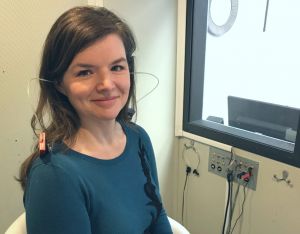|
www.HealthyHearing.com |
Hearing loss is tiring? I was skeptical—until I took a hearing test
Contributed by Joy Victory, managing editor, Healthy Hearing As as the managing editor for Healthy Hearing, I've learned a lot of hearing facts. Some weird: Did you know our ears and noses grow our entire lives? Some fascinating: Your ability to hear songbirds may be one of the first things you lose when you develop age-related hearing loss. (That alone is motivation for me to keep tabs on my hearing.) 
her hearing test. But one topic rendered me a little skeptical: The notion that hearing requires effort and hearing loss exhausts the brain, leading to "ear fatigue." It makes sense, of course, but I've always thought of hearing as akin to breathing or blinking—something we do constantly, yet passively. And then, a few months after starting my job, I took a hearing test at a local audiology clinic. I had started the day shadowing audiologists and learning the ins and outs of testing and fitting—and now it was my turn in the hot seat. 'Wait, was that a beep?'Things started out fine as I sat in the sound-proof booth at Estes Audiology in Austin. With special earplugs squeezed into my ear canals, I began with a speech audiometry test. I felt confident as I repeated words like “comb, wave, dove.” Easy breezy, lemon squeezy, as my daughter likes to say. But then it was time for the pure-tone test, which required pressing a button on a handheld wand every time I heard a beep-like sound. Even if I wasn’t sure I heard anything, I was still supposed to press the button, explained University of Texas audiology doctoral student Hanna Patel. A subsequent series of beeps started up, some loud, some faint, some…wait, was that a beep? Or was it my ears ringing? And before I could decide, I’d hear another beep and hastily press the wand button. Dang, I thought, I think I just missed one. Then I noticed my heart was beating harder, and suddenly I was finding myself mentally strained, trying to focus on the test, worried I couldn’t hear as well as I thought, and getting anxious at the thought of what sounds I’d been missing all these years. I held as still as possible so that any little sound—my hair, my breath—wouldn’t interfere with the testing. Then the test ended, and I let out a big breath. Did I just bomb it? I wasn’t sure. We moved on to the next test, known as the speech-in-noise-test. I listened to a recording of people speaking in a somewhat noisy room, repeating what I thought I heard the main speaker saying. With each sentence, the background noise got more raucous. Suddenly, I no longer heard sentences, only words. By the end of the test, I shrugged: All I could hear was a jumble of voices akin to what a school cafeteria sounds like on ice cream day. My brain had worked hardHanna stepped back into the noise-proof room. And I noticed I was suddenly exhausted. “The hard part is over,” she assured me as she inserted a different set of earplugs to give for an acoustic immittance test. This time, I didn’t have to “do” anything; I could literally just sit there and stare at the wall as I let the device measure the strength of my “acoustic reflexes” and the health of my eardrums and middle ears. The relief I felt made me realize my brain had worked hard as it went through the (painless, non-invasive) hearing test—even though the whole time I had been sitting nearly motionless in a comfortable chair, in a comfortable room. Oh, I thought, this is what people mean when they say hearing requires a lot of brainpower (or "cognitive load" in medical jargon). After all that self-imposed drama, I was relieved to find out I have normal hearing. And I gained a lot more empathy for people who have trouble hearing. When what you hear starts to diminish, your brain tries to compensate, and it will tire easily at the constant guessing game.
But this avoidance strategy can backfire, clinic co-founder and audiologist Dr. Soriya Estes told me. Over time, avoiding sounds and noise means your auditory nerve doesn’t have to work as hard. Research is now showing how this can likely add up to an increased risk of dementia—when you don’t talk and listen to speech as vigorously as you used to, it’s a lot easier to forget not just what the words sound like, but also what they mean. Your hearing: Use it or lose it“It really is use it or lose it,’” Dr. Estes explained. “The auditory nerve needs to be stimulated.” Her challenge as a clinician, she said, is helping people realize this. Because most hearing loss occurs very slowly, people may not even realize just how bad their hearing has gotten—instead, the songbirds seem to slowly disappear, the falling leaves no longer rustle like they once did and people seemingly refuse to speak as clearly as they once did. The early changes are so subtle many people don't stop to think: Has the world changed, or has my hearing? The best way to find out? A hearing test. You'll suffer through a few awkward minutes of beeping sounds and strange voices, but then you'll get your answer: The songbirds are still there, and it's time to hear them again. Joy Victory, managing editor, Healthy Hearing
Related Help Pages:
Hearing loss Tests
|
Featured clinics near me
Hearing Health Solutions from Ohio ENT - Columbus
974 Bethel Rd Ste B
Columbus, OH 43214
Earzlink Hearing Care - Reynoldsburg
7668 Slate Ridge Blvd
Reynoldsburg, OH 43068


Find a clinic
We have more hearing clinic reviews than any other site!


 Joy Victory has extensive experience editing consumer health information. Her training in particular has focused on how to best communicate evidence-based medical guidelines and clinical trial results to the public. She strives to make health content accurate, accessible and engaging to the public.
Joy Victory has extensive experience editing consumer health information. Her training in particular has focused on how to best communicate evidence-based medical guidelines and clinical trial results to the public. She strives to make health content accurate, accessible and engaging to the public.